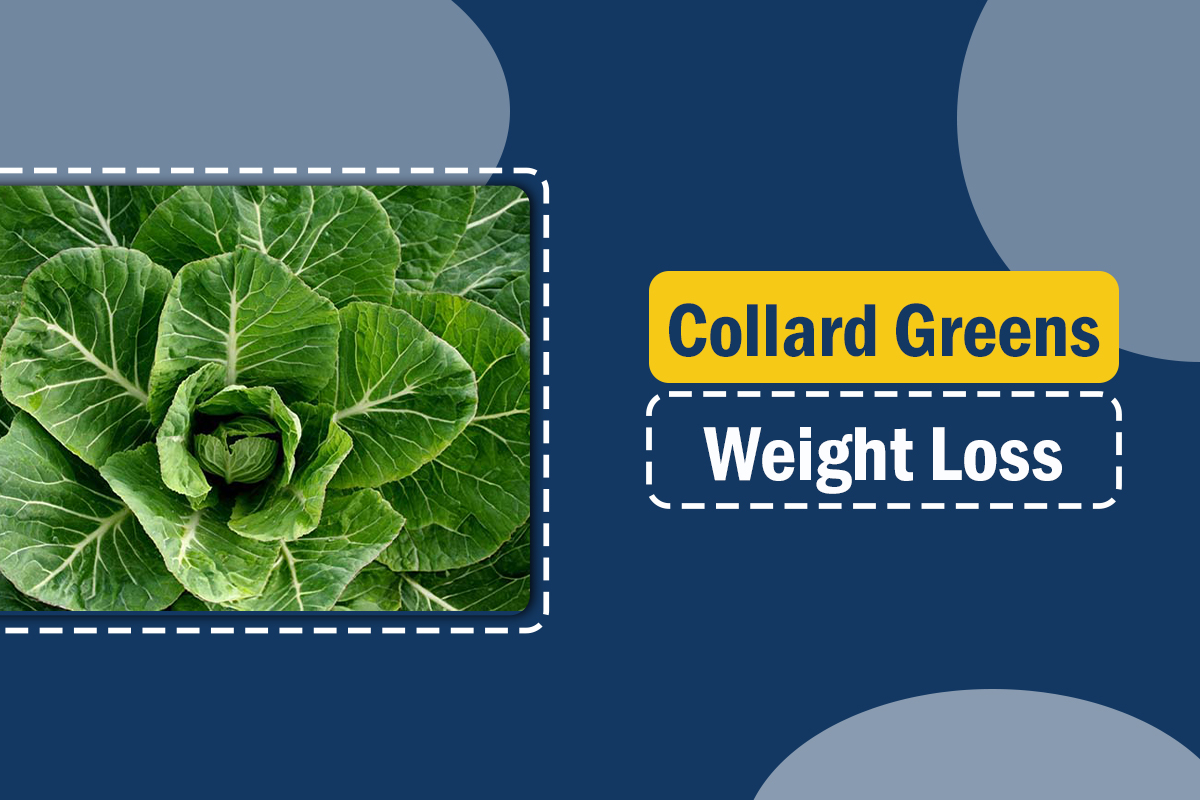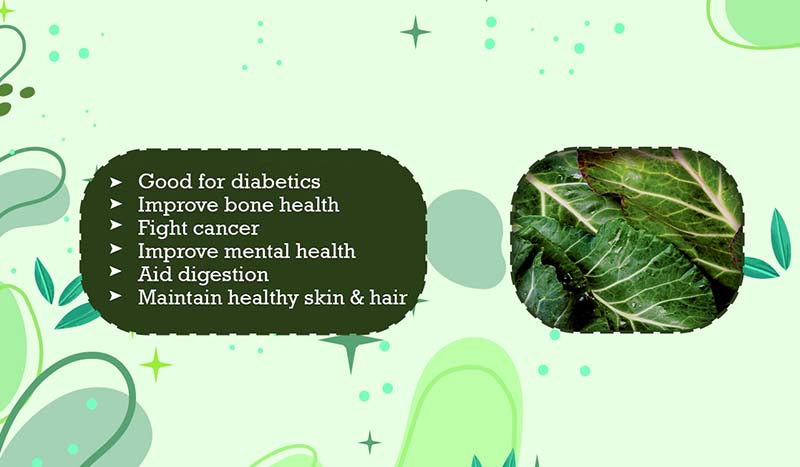Is Collard Greens good for weight loss? Vibrant and leafy, collard greens belong to the esteemed Brassica family, alongside powerhouses like broccoli, cabbage, and kale. Originating from North America, they’ve been a staple in Southern American cuisine for centuries. These greens aren’t just about tradition; they’re a nutritional goldmine. Regularly incorporating collard greens into a balanced diet can unlock a plethora of health benefits, including potential weight loss advantages.
Is Collard Greens Good for Weight Loss?
Collard greens are an excellent choice for anyone looking to lose weight effectively. These leafy vegetables are low in calories, making them an ideal food for a calorie-controlled diet. What makes them particularly beneficial for weight loss is their high fiber content. Fiber aids in digestion and promotes a feeling of fullness, which naturally reduces the tendency to overeat. By incorporating collard greens into your daily meals, you’re less likely to consume excess calories, leading to a healthier weight loss journey.
Moreover, collard greens are not just about aiding weight loss through calorie control and satiety. They are packed with essential vitamins and minerals, contributing significantly to your overall nutritional intake. This includes vitamins such as vitamin A, vitamin C, and vitamin K, as well as minerals like calcium and iron. These nutrients are crucial for maintaining various bodily functions, including immune health, bone strength, and blood coagulation.
Additionally, the antioxidants present in collard greens play a role in overall wellness. They help in combating oxidative stress in the body, which can be beneficial for maintaining long-term health and preventing various diseases.
Eating collard greens every day can be a strategic part of a balanced diet. Not only do they support weight loss by keeping calorie intake in check and enhancing satiety, but they also contribute to overall health with their rich nutritional profile. This makes collard greens a superbly healthy addition to any diet, particularly for those focused on losing weight in a wholesome and sustainable manner.

Nutritional Information for Collard Greens
A cup of raw, chopped collard greens is a nutritional powerhouse with only 11.5 calories. It contains just 0.22g of fat and a mere 6mg of sodium, making it an excellent choice for a heart-healthy diet. Its carbohydrate content is low at 2g, with 1.4g of that being dietary fiber, which is great for digestion. There’s only a tiny amount of sugar, 0.2g, and a solid 1g of protein.
The real stars, however, are the vitamins and minerals. You get a healthy dose of calcium (83.5mg) vital for strong bones. Collard greens shine in their vitamin content: they’re an outstanding source of vitamin K, crucial for blood clotting and bone health, vitamin A for good vision and immune function, and vitamin C for skin health and immune support. They also pack a punch with folate, essential for DNA synthesis and repair. The presence of beta-carotene and other carotenoids like lutein and zeaxanthin contributes to eye health.
- Calories: 11.5
- Fat: 0.22g
- Sodium: 6mg
- Carbohydrates: 2g
- Fiber: 1.4g
- Sugar: 0.2g
- Protein: 1g
- Calcium: 83.5mg

Health Benefits of Collard Greens
Collard greens, a member of the brassica family, are celebrated for their nutritional benefits. This dark, leafy green is a powerhouse of health advantages.
Enhances Bone Strength
Rich in vitamin K, collard greens are essential for healthy bones. Regular consumption of vitamin K aids in calcium absorption, reinforcing bone structure and potentially reducing osteoporosis risk.
May Provide Protection Against Certain Cancers
The carotenoids in collard greens, known for their antioxidant properties, help guard against free-radical damage linked to cancer. They also contain glucosinolates, sulfuric compounds that protect DNA from damage, common in cruciferous vegetables.
Improves Cholesterol Levels
Collard greens soluble fiber effectively reduces unhealthy LDL cholesterol. It binds with LDL cholesterol in the intestines for excretion, and attaches to bile acids, prompting more bile production using cholesterol, thus lowering blood cholesterol levels.
May Lower the Risk of Type 2 Diabetes
Eating leafy greens like collard greens may decrease the risk of developing type 2 diabetes. Their antioxidants protect against damage contributing to diabetes, and their fiber content moderates blood glucose absorption.
Promotes Regularity
The soluble fiber in collard greens increases stool bulk, easing constipation and promoting regular bowel movements.
Supports the Immune System
Vitamins A and C in collard greens bolster the immune system. Vitamin C maintains healthy blood cells, while vitamin A is crucial for the efficient functioning of T-cells, which combat invading pathogens.
Contributes to Heart Health
Regular consumption of green, leafy vegetables like collard greens is associated with reduced cardiovascular disease risk. Their folate content helps lower homocysteine levels, a risk factor for heart disease, blood clots, and artery hardening.
Protects Vision
Collard greens contain lutein and zeaxanthin, antioxidants that may shield against age-related eye problems, including cataracts and macular degeneration.
Supports Fetal Development
For those pregnant or planning pregnancy, the folate in collard greens is vital. Adequate folate intake can prevent certain neural tube defects, like spina bifida.
Collard Greens Side Effects
Eating fiber-rich foods like collard greens can sometimes lead to bloating and gas since they’re tougher to digest. Initially, you might notice increased flatulence, but your body typically adjusts over time, and these symptoms usually subside.
Be cautious with Collard Greens if:
- You’re allergic to similar veggies: If you’re allergic to cruciferous vegetables like cabbage and broccoli, it’s best to avoid collard greens.
- You have hypothyroidism: Collard greens contain goitrogens, which can affect thyroid function, especially if your iodine levels are low. Cooking these greens can reduce this effect, so consider having them cooked rather than raw.
- You’re pregnant: The impact of high levels of goitrogens, like those in collard greens, isn’t fully known during pregnancy. It’s okay to eat them, but stick to normal serving sizes.
- You take blood thinners: Vitamin K in green veggies, including collard greens, might affect medications like warfarin. It’s important to discuss vitamin K intake with your doctor if you’re on blood thinners.
- You’re prone to kidney stones: If you tend to get oxalate kidney stones, be mindful that collard greens, kale, and spinach have oxalates, which can contribute to kidney stones.
Is It Safe to Consume Collard Greens Daily?
Collard greens are usually safe for everyday consumption, but it’s good to be aware of some potential issues if you eat them in large amounts. These greens have substances called oxalates, which can sometimes affect how well your body absorbs minerals like calcium.
In very rare cases, eating a lot of oxalates might lead to specific health concerns. However, for most people, oxalates aren’t a big worry. Also, collard greens are rich in dietary fiber, which can cause flatulence and bloating for some. The key is to eat collard greens as a part of a diverse diet filled with a variety of fresh fruits and veggies. To sum up, it’s generally fine to eat collard greens every day, but remember to do so in moderation and as part of a well-rounded diet.
“Is Collard Greens Good for Weight Loss?” – Absolutely! These greens are a powerhouse for anyone looking to shed pounds in a healthy way, thanks to their low calories and high fiber. Your experiences with collard greens matter to us. Have they been part of your weight loss journey? Please share your stories. And for more insightful reads, don’t forget to check out our other blogs at MyahPhysician. Your journey to a healthier you is just a story away!

Marconi Abreu, M.D.
Internal Medicine – Endocrinology Type 1 Diabetes Type 2 Diabetes
Marconi Abreu, M.D., is a distinguished endocrinologist specializing in diabetes at UT Southwestern Medical Center, where he serves as an Associate Professor and the Medical Director of the Parkland General Endocrinology Clinic. With a medical degree from Universidade Federal da Bahia, Brazil, Dr. Abreu furthered his expertise in internal medicine and endocrinology at the University of Connecticut and UT Southwestern.
His clinical focus lies in Type 1 and Type 2 diabetes management, leveraging advanced technology to empower patients. Dr. Abreu also has a keen interest in reproductive endocrinology, adrenal, and pituitary disorders. His research contributions are extensive, including several journal articles and case studies, significantly advancing understanding in his field.
Outside of medicine, Dr. Abreu enjoys cooking, playing the guitar, traveling, and following the stock market. His multi-faceted approach to healthcare, combined with his varied interests, makes him a respected figure in the medical community, particularly in the areas of diabetes and endocrinology.
PUBLICATIONS
- Patel SM, Marconi A, et al. “Visual Vignette.” Endocrine Practice (2019).
- Abreu M, et al. “A Randomized Trial Comparing the Efficacy and Safety of Treating Patients with Very Elevated HbA1c Levels…” Diabetes, Obesity & Metabolism (2019).
- Carruthers D, Abreu M, et al. “Determining Insulin Dose at the Time of Discharge in a High-Risk Population…” Endocrine Practice (2019).
- Patel S, Abreu M, et al. “Effect of Medication Adherence on Clinical Outcomes in Type 2 Diabetes…” BMJ Open Diabetes Research & Care (2019).
- Custodio JS, Abreu M, et al. “SGLT2 Inhibition and Heart Failure-Current Concepts.” Heart Failure Reviews (2018).


